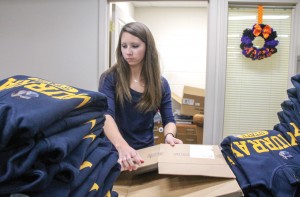Being in school can mean using the “broke college student” excuse when it comes to putting down that new pop album or opting out of a fancy restaurant.
Tuition can get pricey and leaves having a job an unavoidable situation. In Murray, job opportunities on and off campus are open to students who choose to work while attending school.
Although jobs provide financial stability for students, a balance between work and school has to be established.
“Balancing a bank job and being a full-time student can be difficult at times,” said Jaclyn Solly, junior from Murray and a teller at First Southern National Bank in Princeton, Ky. “Having my job is a privilege and a wonderful opportunity.”
Flexibility is an important factor in choosing whether to work while attending school because the student must have adequate study and homework time as well, said Tina Reynolds, sophomore from Murray and employee at Winslow Dining Hall.

Tori Gray, freshman from Harrisburg, Ky., folds sweatshirts in the University Bookstore.
“I choose to do class assignments as soon as possible to be ahead of the game,” Solly said. “The responsibility of holding a (bank) job definitely carries over into having responsibility as a student.”
Deciding to work on or off campus is a student preference.
Usually, jobs on campus — such as working in a dining hall, the bookstore, financial aid office — work with students’ schedules so they are provided with enough time to attend classes, make it to work in a generous amount of time and retain free time for studying as well as much-needed relaxation.
“I work on campus because it’s easier to get to,” Reynolds said. “I don’t have to travel far. They work with my schedule and I’m never scheduled when I have a class. I also don’t work very late when I have an important assignment to work on.”
Working off campus can be more convenient for students looking to branch out and meet with a variety of people other than students and faculty.
“I plan to be a teacher in Princeton someday. I want to be acquainted with as many people from my community as possible,” Solly said.
There are also more options when it comes to choosing a job off campus. Although dedication and commitment are important in any position, off-campus jobs may require extra organizational and scheduling skills. Setting aside travel time to and from work as well as to classes can prove to be a challenge if it is not planned out, Reynolds said.
According to the 2011 U.S. Census report, 71 percent of the nation’s undergraduate population works while attending school. For the other 29 percent, jobs may not be needed due to already comfortable financial situations, abundance in scholarships and financial aid or the preference of focusing on their education without the distraction of a job.
“For me, it’s important to focus on school at this time,” said Adriana Estrada, freshman from Murray. “It’s my first year in college and my education is my number one priority.”
For some students, work can also be a therapeutic activity that allows them to take a break from school-related tasks, said Mike Waag, professor in the College of Humanities and Fine Arts.
“I look ahead to what assignments and exams I have coming up in my academic schedule so that I’m able to finish them without worrying about not having time to finish them due to work,” Reynolds said.
Planning ahead and finishing assignments before they are due is an option most professors have open to their students.
Professors who have communicated with working students are aware of the pressures that students are under when it comes to paying their way through college.
“I’m sure many students feel a great deal of pressure,” said Carrie Jerrell, assistant professor in the department of English and philosophy. “Especially if maintaining a job is the only way they can afford to pay for school. Hopefully, though, earning a degree that will increase their chance of getting a job that’s better than their current one is the priority for students who work.”
In most cases, communicating with professors about when classes will be missed and when assignments will be late can demonstrate responsibility and earn leniency and breathing room when getting out of work is not an option.
However, true balance develops from working with supervisors and managers at the workplace as well as professors so that the focus on one is not greater than the other, Reynolds said.
“A student could miss a couple of classes or quizzes and still manage to get the maximum number of points,” Wagg said. “However, I can’t be totally lenient so I encourage my students to prepare for the semester so that they only have to miss when absolutely necessary.”
Some professors, as well as students, know how it is to work while attending school. For that reason, they are able to work closely with students when it comes to helping them manage their time between working and doing assignments. Limiting the amount of hours a student works ensures that unneeded stress will not be added and time to finish any task, school related or not, can be completed, Waag said.
Knowing what is going on at all times and the ability to plan can be the difference between an overload and success.
“I would suggest being as rigorously habitual as (students) can,” Jerrell said. “Know which hours of their daily and weekly schedules they can devote to school and work; which hours are for going to work; which hours are for sleeping, grocery shopping, doing the laundry, etc. And stick to doing those tasks during those hours so that they become habits.”
Story by Katrina Yarbrough, Staff writer



























































































